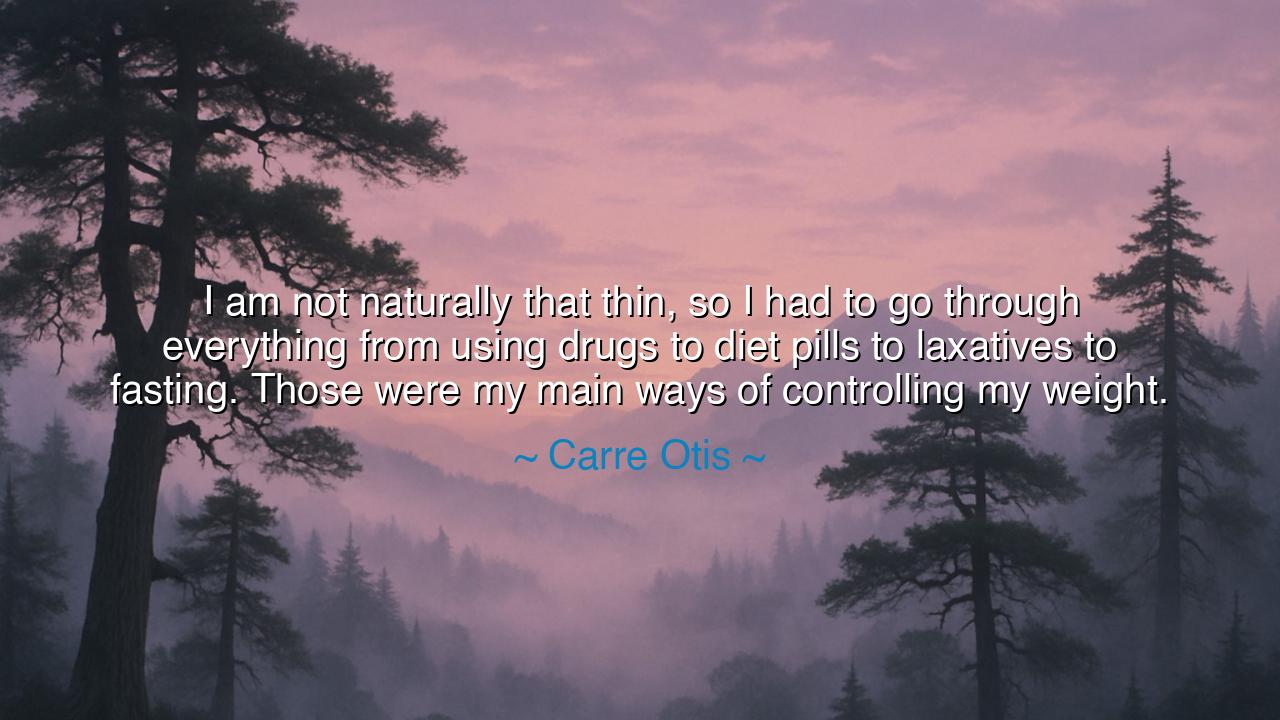
I am not naturally that thin, so I had to go through everything
I am not naturally that thin, so I had to go through everything from using drugs to diet pills to laxatives to fasting. Those were my main ways of controlling my weight.






In the grand narrative of life, where the body and mind are intertwined in a dance of self-discovery and growth, the pursuit of beauty can sometimes take us down a dark and dangerous path. Carre Otis’ words resonate with those who have struggled against the pressures of external expectation and the yearning for control: “I am not naturally that thin, so I had to go through everything from using drugs to diet pills to laxatives to fasting. Those were my main ways of controlling my weight.” In this confession, Otis speaks to the ancient truth that the pursuit of physical perfection—especially when driven by external forces—often leads to suffering and self-destruction. It is a tragic cycle, one that echoes throughout history, where the human desire for control over the body can become a chain, rather than a source of freedom.
The ancient Greeks, who celebrated the harmony between mind, body, and spirit, also understood the dangers of excessive control. Socrates, that great philosopher, taught that true wisdom comes not from the control of the body or mind through deprivation but through balance and moderation. In his view, to force the body into unnatural extremes—whether through food or exercise—was not an act of strength but of weakness, for it reflected a lack of awareness and acceptance of the body’s true needs. The Greeks believed that only through the cultivation of balance could one achieve harmony, and in this, they warned against any extreme measures, such as fasting or excessive restriction, that might harm the body and spirit.
The Romans, too, understood the perils of indulgence and excess, but they also recognized that a life of moderation was the only true path to lasting health. The philosopher Cicero often wrote about the importance of self-discipline and the dangers of self-deception. In his letters, he warned against the temptation to engage in extreme practices for the sake of appearance. In a similar way, Otis’ words speak to a deep suffering—the constant struggle to control something as fleeting as physical appearance. The tools she turned to—diet pills, laxatives, and fasting—are not solutions but mere illusions, temporary fixes that only create more harm in the long run. Cicero understood that true strength and beauty lie not in rigid control but in acceptance of oneself and the cultivation of balance.
Seneca, another Stoic philosopher, warned that pleasure sought through extremes often leads to the destruction of both the body and mind. He believed that the key to living a virtuous and fulfilling life was not in indulging in excess or depriving oneself in unhealthy ways, but in developing a mindset of balance and self-control. In a way, Otis’ confession illustrates the suffering caused by the inability to reconcile self-acceptance with external expectations. Her journey through the use of substances and extreme dieting is a reflection of the inner conflict that many face when they seek to fit into a mold crafted by society’s fleeting standards of beauty. The lesson here is clear: true beauty, whether physical or spiritual, is not achieved through extremes but through a life rooted in balance and self-compassion.
Consider the story of Alexander the Great, a man who conquered vast lands and sought glory on every battlefield. Yet, his inability to moderate his desires led him to a life of excess. His indulgence in food, drink, and even his emotions was said to have weakened him in the final years of his life. Alexander’s inability to recognize the limits of his power, both externally and internally, mirrors the plight of those like Otis, who fall into the trap of seeking control through methods that harm rather than heal. Alexander’s fate, much like the modern struggles of those who turn to extreme measures for control, teaches us that true power comes not from control but from understanding and accepting the body as it is, in all its imperfection.
The lesson from Otis’ words is one of deep awareness and self-acceptance. The pursuit of beauty or perfection, when driven by external pressures, often leads to suffering, destruction, and a lack of inner peace. The ancients—from the Greeks to the Stoics—understood that the body is not something to be manipulated or controlled but to be cared for and nourished with wisdom. The body, like the mind, must be treated with respect and understanding. Otis’ experience with extreme dieting and harmful methods serves as a cautionary tale—one that urges us to cultivate healthy habits, not as a means to control, but as a way to honor the natural rhythms of the body.
The true path to health and harmony, then, lies not in the extremes of denial or excess, but in a balanced approach to nourishment, both physically and mentally. Just as the ancients taught, we must learn to live with moderation, choosing to nourish the body and mind with respect, patience, and awareness. Rather than turning to harmful practices or seeking the unattainable, we must embrace the imperfection of the human form and recognize that true beauty comes from a life of balance, acceptance, and self-compassion. Let Otis’ story be a reminder that the journey to well-being is not about control but about acceptance, not about extremes but about embracing the simple wisdom of living a life rooted in balance.






AAdministratorAdministrator
Welcome, honored guests. Please leave a comment, we will respond soon